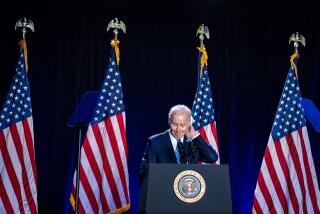Buchanan Feeds Class War in the Information Age
- Share via
WASHINGTON — Last week, Patrick J. Buchanan left the Republican Party and joined the Reform Party, hoping to become its nominee for president. If he ever has any doubts about whether he did the right thing, all he has to do is look out over the people who show up at his rallies.
Buchanan crowds don’t look like Republican crowds, they don’t clap like Republican crowds and they don’t eat like Republican crowds. There are none of those Chamber of Commerce officers in golf shirts and tasseled loafers. Instead, Buchanan draws the beefy, 300-pound guys with tattoos up their arms and sleeveless T-shirts. He draws the guys with shaggy biker beards, and the Teamsters who park their rigs in the lot and get hoarse chanting, “Go, Pat, go!” It may be hard to classify exactly which political category these people belong to, but they are certainly not Republicans.
Buchanan is also right to leave the party because he is trying to do something that is anathema to GOP doctrine. Back in 1992, Buchanan gave a speech at the Republican convention in Houston declaring a culture war, which the GOP faithful were happy to enlist in. But over the past six years, Buchanan has stopped talking about culture war and started talking about class war, which the GOP faithful do not want any part of. Sometime in that intervening period, Buchanan decided he was going to be the savior pf the proletariat.
Furthermore, he’s trying to create a new kind of class war for the information age. Angry populists used to rail against Wall Street barons in their top hats. But now half the country has money in mutual funds, so it’s no longer elite to be making “unearned income” in the stock market. In the information age, class resentment is directed at the third-wave/fast-company keyboard jockeys: all the high-tech impresarios who go to work in jeans and hiking boots with their cell phones dangling from their belt loops on mountain-climbing carabiners. That’s where Buchanan directs his ire, not only at the malefactors of great wealth, but at the malefactors with graduate degrees.
In his book “The Great Betrayal,” Buchanan lists the objects of his wrath, including “lobbyists, academics, journalists, executives, professionals, high-tech entrepreneurs.” Journalists may protest, “We don’t make enough money to be on the wrong side of the class war.” But if you look down the row at press conferences, you realize Buchanan has a point. Reporting used to be a whiskey-and-beer profession. Now it’s Harvard and Stanford grads, sipping bottled water and angling to get contracts on MSNBC. The new class war is between what Buchanan calls his “peasant army,” which means the people who eat big breakfasts at Denny’s and like to go hunting and power-boating, against what he calls the “lords and barons,” the professionals who prefer earth-tone wardrobes and salads made from obscure brands of lettuce.
At a rally in Iowa last summer, for example, Buchanan was on stage in white slacks, brown shoes and a red, white and blue baseball cap, whipping the crowd into a frenzy about the evil elites who betray the working man. There were about eight journalists standing to the right of the stage. They had on their khakis and light-blue Oxford shirts. They looked through their round, horned-rimmed glasses at their little notebooks. In that Buchanan throng, they looked like the Weenie Corner at a Monster Truck rally.
Every time Buchanan would attack the “Washington pundits” (talk about being a traitor to your class!), he’d stare at the journalists with a weird smile. At first, it seemed he was letting them in on a private joke. But as he stoked up his class-warfare rhetoric, his smile began to seem like the sort a farmer might give to a succulent turkey on Thanksgiving morning. At the height of the rally, the class resentment was at full throttle. If Buchanan had yelled, “First, we kill all the Palm Pilot owners!” the crowd would have torn those journalists to shreds.
Buchanan’s main argument is that the working class has been betrayed by an information-age elite. The elite benefits from free trade while the working class does not. This elite doesn’t mind sending troops overseas, because their children are in college, not the army.
Buchanan has sparked a fury with his theory that the United States should have tried to make peace with the kaiser in World War I and Adolf Hitler in World War II. It sounds like a wacky side issue. But Buchanan’s notions about the world wars are central to his understanding of the world. He wants to show that America’s elites have always betrayed the working class by getting them involved in needless wars.
Buchanan’s view of history is that America was once a noble republic, filled with yeoman farmers and carpenters and mill workers, people connected to the land by sweat and blood. But then cosmopolitans took control. “We love the old republic, and when we hear phrases like ‘new world order,’ we release the safety catches on our revolvers,” he once wrote.
Buchanan emerges from a strain of conservatism called paleoconservatism, centered on Chronicles magazine. The paleocons are not admirers of the free market, like other conservatives. Samuel Francis, a Buchanan friend and advisor, summarized their worldview in Chronicles a few years ago, “It is in the long-term interest of the overclass (not of anyone else) to managerialize society so that all aspects of life are organized, packaged, routinized and subjugated to manipulation by the technical skill the overclass possesses, and that interest requires the undermining of institutions and norms that are independent of, and impediments to, overclass control.” This sort of language explains why the Buchananites can make alliances with Marxists like Lenora Fulani.
How has the overclass reacted to the Buchananite rabble? First, by pointing out that he holds unenlightened views. He is an anti-Semite. But that is precisely how he proves his bona fides as a populist. Left-wing academics may fantasize that someday there will emerge a working-class populist movement with socially enlightened views about gays, minorities and Jews. But, in reality, angry populists always break the rules of polite society and their followers admire them for it.
Second, overclass types declare that Buchanan is only speaking for himself. “Does anyone believe that Mr. Buchanan’s ‘peasant army’ really exists?” the New York Times asked in an editorial last week.
Well, there may not be as many peasant warriors as Buchanan imagines. But their numbers are not insignificant. Buchanan now gets about 9% in the polls, taking 6% from the GOP and 3% from Democrats.
The conventional view is that his support will go down. But why should it? He’s just weathered a storm of accusations about anti-Semitism, and he’s still got nearly one-tenth of the electorate with him. He is about to start a national campaign--he’s a great campaigner--and if he wins the Reform Party nomination, he’ll have more than $10 million to spend on TV ads. It’s perfectly reasonable to think he could end up with about 9% of the vote, or more. Similar candidates have drawn twice that percentage in European elections. (Though he could begin to draw more from Democrats as his working-class rhetoric gets out.)
There’s another factor helping him. His argument is not entirely bogus. There really are losers in the information economy. The vast majority benefit, but some do not. The financial rewards for education have skyrocketed over the past two decades. But those without education have suffered. Nobody else on the political spectrum is running for president against the global economy and speaking up for these people, so they may end up casting their lot with Buchanan.
This is going to be a permanent feature of U.S. politics. Some people who thrived in the machine age--the people who know how to fix engines--are not going to thrive in the new economy. So they are going to be in a bad mood. Us Palm Pilot types needn’t apologize for the glorious new world that is aborning--it really is glorious--but we shouldn’t dismiss the rump strength of the dissidents, whether they are voting for Buchanan or anyone else. *
More to Read
Get the L.A. Times Politics newsletter
Deeply reported insights into legislation, politics and policy from Sacramento, Washington and beyond. In your inbox three times per week.
You may occasionally receive promotional content from the Los Angeles Times.










